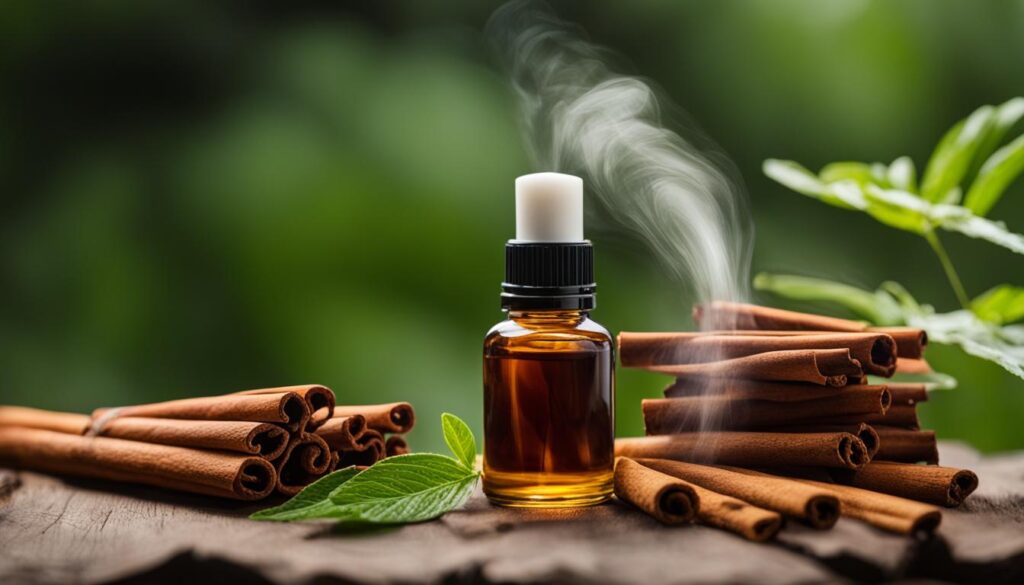When it comes to incorporating natural remedies into our daily lives, cinnamon oil is an excellent option. Derived from the bark or leaves of the Cinnamomum verum or Cinnamomum cassia tree, this essential oil offers a myriad of uses and benefits.
Cinnamon oil has been studied for its antibacterial, antifungal, antidiabetic, and antioxidant properties. In addition to its therapeutic properties, it is commonly used in aromatherapy for its mood-enhancing effects. Its warm and spicy aroma adds a delightful touch to any space.
But the benefits of cinnamon oil don’t stop there. It also possesses antibacterial properties that can support oral health, making it a common ingredient in toothpaste and mouthwash. Furthermore, anecdotal evidence suggests that cinnamon oil may promote hair growth, although more research is needed to confirm this benefit.
In terms of culinary and personal care uses, cinnamon oil is a popular flavoring agent in various food products and is used in toiletries such as soap and body lotion. The versatility of cinnamon oil allows it to be a valuable addition to multiple aspects of our lives.
In this article, I will delve deeper into the different uses and benefits of cinnamon oil, as well as provide tips on selecting high-quality oil and using it responsibly. Let’s explore the incredible potential of this essential oil.
Key Takeaways:
- Cinnamon oil has antibacterial, antifungal, antidiabetic, and antioxidant properties.
- It is commonly used in aromatherapy for its mood-enhancing effects.
- Cinnamon oil supports oral health due to its antibacterial properties and is often found in toothpaste and mouthwash.
- Although not scientifically proven, there is anecdotal evidence suggesting that cinnamon oil may promote hair growth.
- Cinnamon oil is used in culinary and personal care products, adding a warm and flavorful touch.
Types of Cinnamon Oil and their Properties
Cinnamon oil comes in two main types – cassia cinnamon and Ceylon cinnamon. Let’s explore the properties of each:
Cassia Cinnamon
Cassia cinnamon is derived from the Cinnamomum cassia tree. It is more commonly found in commercially available cinnamon oils. The distinct scent and flavor of cassia cinnamon make it a popular choice in culinary applications. This type of cinnamon oil contains significant levels of cinnamaldehyde, which contributes to its antimicrobial and antioxidant properties. It is known for its warming and stimulating effects.
Ceylon Cinnamon
Ceylon cinnamon, also known as “true” cinnamon, comes from the Cinnamomum verum tree. It is considered to be of higher quality compared to cassia cinnamon but is also more expensive. Ceylon cinnamon oil has a sweeter and more delicate flavor profile. It contains eugenol, a compound that has been studied for its anti-inflammatory and analgesic properties. Ceylon cinnamon oil is often used in aromatherapy due to its calming and relaxing effects.
Both types of cinnamon oil offer unique benefits and can be used in various applications. However, it’s important to note that cassia cinnamon oil may have a stronger scent and flavor compared to Ceylon cinnamon oil.
To summarize:
| Type | Derived from | Properties |
|---|---|---|
| Cassia Cinnamon | Cinnamomum cassia tree | Contains cinnamaldehyde, antimicrobial, antioxidant, warming, and stimulating effects |
| Ceylon Cinnamon | Cinnamomum verum tree | Contains eugenol, anti-inflammatory, analgesic, sweet, and calming properties |
Now that we’ve explored the different types of cinnamon oil, let’s dive deeper into its uses in aromatherapy in the next section.
Cinnamon Oil for Aromatherapy

Cinnamon oil is a popular choice in aromatherapy due to its mood-enhancing properties and ability to promote relaxation. While scientific research on the specific effects of cinnamon oil in aromatherapy is limited, many individuals find its warm and spicy scent soothing and enjoyable. Whether used in a diffuser or applied topically, cinnamon oil can create a relaxing ambiance and enhance overall well-being.
Adding a few drops of cinnamon oil to a diffuser creates an inviting atmosphere with its comforting aroma. The subtle fragrance can help create a sense of calm and tranquility, making it an ideal choice for creating a relaxing environment after a long day.
“The scent of cinnamon oil has a therapeutic effect on my mood. It instantly uplifts me and helps me unwind.” – Jessica, aromatherapy enthusiast.
In addition to diffusing, cinnamon oil can also be diluted with a carrier oil and applied topically for a more personalized aromatherapy experience. Before applying, it is important to follow dilution guidelines to prevent skin irritation. A common dilution ratio is one drop of cinnamon oil to every 30 to 40 milliliters of carrier oil, such as almond or coconut oil. This ensures a safe and enjoyable aromatherapy experience.
As with all essential oils, it is important to use cinnamon oil responsibly. Avoid direct contact with the skin without dilution and keep it out of reach of children. If you have any known allergies or sensitivities, it is advisable to perform a patch test before using cinnamon oil for aromatherapy.
Benefits of Cinnamon Oil in Aromatherapy:
- Enhances mood and promotes relaxation
- Creates a warm and inviting atmosphere
- May help alleviate stress and anxiety
- Potential to improve overall well-being
Cinnamon oil’s unique scent and potential mood-enhancing properties make it a valuable addition to any aromatherapy routine. Whether used in a diffuser or applied topically, its aromatic benefits can help create a calming environment and enhance relaxation.
| Aromatherapy Benefits of Cinnamon Oil | Usage Method |
|---|---|
| Mood enhancement | Diffuse a few drops of cinnamon oil in a diffuser |
| Promotes relaxation | Add a few drops of cinnamon oil to a bath or dilute with a carrier oil for topical application |
| Creates a calming ambiance | Combine cinnamon oil with other soothing essential oils like lavender or chamomile |
Cinnamon Oil for Oral Health

Cinnamon oil has long been recognized for its antibacterial and antifungal properties, making it an excellent natural remedy for maintaining oral health. Research has shown that cinnamon oil is effective against oral infections and cavities caused by Streptococcus mutans, a bacteria commonly found in the mouth.
The antibacterial properties of cinnamon oil can help eliminate harmful bacteria in the oral cavity, reducing the risk of infections and promoting overall oral hygiene. Additionally, cinnamon oil has been found to have an antimicrobial effect on Pseudomonas aeruginosa, a drug-resistant bacteria that can cause oral health complications.
Many oral care products, such as toothpaste and mouthwash, use cinnamon oil for its beneficial properties. The addition of cinnamon oil helps enhance the antimicrobial and antibacterial effects of these products, providing an effective defense against oral infections.
Incorporating cinnamon oil into your oral care routine can have multiple benefits, including fresher breath, reduced plaque formation, and improved gum health. However, it’s important to note that cinnamon oil should always be used in appropriate concentrations and in conjunction with regular dental hygiene practices, such as brushing and flossing.
“Cinnamon oil’s antibacterial properties make it a valuable addition to oral care products.”
To summarize, cinnamon oil offers significant oral health benefits due to its antibacterial properties. It can help combat oral infections and cavities, as well as provide additional protection against drug-resistant bacteria. Incorporating cinnamon oil into your oral care routine can contribute to improved oral hygiene and overall oral health.
| Benefits of Cinnamon Oil for Oral Health |
|---|
| 1. Antibacterial properties help eliminate harmful oral bacteria. |
| 2. Effective against Streptococcus mutans, a bacteria that causes oral infections and cavities. |
| 3. Antimicrobial effect against drug-resistant bacteria like Pseudomonas aeruginosa. |
| 4. Enhances the antibacterial effects of oral care products. |
| 5. Contributes to fresher breath, reduced plaque formation, and improved gum health. |
Cinnamon Oil for Hair Growth

When it comes to promoting hair growth, cinnamon oil has garnered attention for its potential benefits. While scientific evidence is currently lacking to support its efficacy in humans, some studies conducted on mice have shown promising results, suggesting that cinnamon oil may have a thickening and growth effect on hair.
Although anecdotal evidence and traditional practices have long touted the use of cinnamon oil for hair growth, it is important to approach these claims with caution and seek further research to confirm the benefits in humans.
One popular method of using cinnamon oil for hair growth is by creating a hair mask with other natural ingredients. Anecdotal reports suggest that combining cinnamon oil with olive oil and honey can help stimulate hair growth and increase hair thickness. However, it’s important to note that individual results may vary, and it’s always recommended to perform a patch test before applying any new hair treatment to the scalp.
While further research is needed to fully understand the effects of cinnamon oil on hair growth, incorporating it into your hair care routine may provide potential benefits. If you’re interested in trying cinnamon oil for hair growth, consider consulting with a dermatologist or hair care professional for personalized advice.
Culinary and Cosmetic Uses of Cinnamon Oil

Cinnamon oil is a versatile ingredient that finds its way into a variety of culinary and cosmetic products. Its warm and spicy aroma adds a pleasant fragrance, while its distinct flavor enhances the taste of numerous dishes and beverages.
Culinary Uses of Cinnamon Oil
In the culinary world, cinnamon oil is a popular choice for food flavoring. It is commonly used in:
- Sugar-free gum: Cinnamon oil provides a delightful burst of flavor to sugar-free chewing gum, offering a refreshing and aromatic experience.
- Tea: A few drops of cinnamon oil can be added to tea, infusing it with a rich and fragrant taste. It pairs well with black tea, herbal blends, and even chai latte.
- Baked goods: Cinnamon oil is frequently used in the preparation of cookies, cakes, bread, and other baked goods. It adds a depth of flavor and a cozy aroma that is irresistible.
Whether you’re sipping on a warm cup of cinnamon-infused tea or indulging in a cinnamon-spiced dessert, the culinary uses of cinnamon oil elevate the taste and aroma of your favorite delicacies.
Cosmetic Uses of Cinnamon Oil
Aside from its culinary applications, cinnamon oil also serves as a valuable ingredient in various toiletries and cosmetic products. Its distinct scent and potential benefits make it an alluring addition to personal care routines. Some common cosmetic uses of cinnamon oil include:
- Toothpaste and mouthwash: Cinnamon oil’s antibacterial properties help combat oral bacteria, making it a valuable ingredient in toothpaste and mouthwash formulations. It provides a refreshing and invigorating experience while promoting oral health.
- Soap: Cinnamon oil can be found in soap, imparting a warm and comforting fragrance to cleansing products. Its aroma can create a soothing and luxurious bathing experience.
- Body lotion: Cinnamon oil, when incorporated into body lotions and creams, can leave your skin smelling delightful and feeling nourished. It adds a touch of warmth and indulgence to your daily skincare routine.
Using cinnamon oil in cosmetic products not only enhances their fragrance but also imparts potential benefits that can elevate your self-care rituals.
Furthermore, cinnamon oil can be used to scent room sprays, candles, and seasonal items like potpourri, invoking a cozy and inviting atmosphere in your home.
Culinary and Cosmetic Uses of Cinnamon Oil
| Culinary Uses | Cosmetic Uses |
|---|---|
| Sugar-free gum | Toothpaste and mouthwash |
| Tea | Soap |
| Baked goods | Body lotion |
Whether you’re spicing up your favorite recipes or indulging in self-care, cinnamon oil proves to be a valuable ingredient with its culinary and cosmetic uses.
Tips and Cautions for Using Cinnamon Oil

When it comes to using cinnamon oil, there are a few important tips and cautions to keep in mind. By following these guidelines, you can ensure a safe and enjoyable experience with this versatile essential oil.
Dilution Guidelines
One of the most important aspects of using cinnamon oil is dilution. Due to its potency, cinnamon oil should never be used at full strength, whether applied topically or ingested. Diluting it with a carrier oil is essential to prevent skin irritation and other potential adverse reactions.
| Usage | Recommended Dilution |
|---|---|
| Topical Use | 1 drop of cinnamon oil for every 30-40 milliliters of carrier liquid |
| Ingestion | Consult a healthcare professional for appropriate dilution and dosage |
By adhering to these dilution guidelines, you can safely enjoy the benefits of cinnamon oil without any skin irritation or other unwanted effects.
Cautions and Allergies
While cinnamon oil is generally safe for use, there are a few precautions to consider. Firstly, cinnamon oil should never be applied directly to the skin without dilution, as this can cause irritation and potentially lead to sensitization over time. Additionally, some individuals may have a known allergy to cinnamon, so it is important to avoid using cinnamon oil if you are allergic.
If you are new to using cinnamon oil, it is always recommended to perform a patch test before applying it to a larger area of your skin. This involves applying a small amount of diluted cinnamon oil to a small patch of skin and monitoring for any adverse reactions for 24 hours. If any redness, itching, or other signs of irritation occur, discontinue use immediately.
Note: Always consult a qualified healthcare professional before using cinnamon oil, especially if you have any underlying health conditions or are pregnant or breastfeeding.
By following these usage tips and cautions, you can confidently incorporate cinnamon oil into your wellness routine while ensuring safety and optimal results.
Selecting and Storing High-Quality Cinnamon Oil

When it comes to choosing the right cinnamon oil, quality should be your top priority. To ensure you’re getting a high-quality product, look for reputable brands that prioritize using natural and pure ingredients.
When selecting cinnamon oil, check the label for the source of the oil. Ideally, you want oil that is derived from pure cinnamon bark or leaves, as these parts of the cinnamon plant contain the highest concentration of beneficial compounds.
Avoid oils that contain additives or synthetic fragrances, as these can diminish the quality and potency of the oil. Instead, opt for oils that are free from any unnecessary ingredients, ensuring you’re getting the full benefits of cinnamon oil.
Once you have selected your high-quality cinnamon oil, proper storage is crucial to maintain its potency and extend its shelf life. Store the oil in a cool, dark place to prevent exposure to heat and sunlight, as these factors can degrade the oil over time.
Consider using amber glass bottles to store your cinnamon oil, as they offer better protection against light exposure. Additionally, make sure the container is tightly sealed to prevent air from entering, as air can also contribute to the degradation of the oil.
By choosing high-quality cinnamon oil and implementing proper storage practices, you can ensure that your oil remains potent and ready for use whenever you need it.
Final Thoughts on Cinnamon Oil Uses and Benefits
Cinnamon oil is a versatile and valuable addition to a wide range of applications. Its uses and benefits extend to various aspects of personal care, culinary adventures, and even aromatherapy. With its mood-enhancing properties, cinnamon oil can bring a touch of warmth and tranquility to your day.
One of the notable features of cinnamon oil is its antibacterial properties. This makes it a valuable asset when it comes to maintaining oral health. It has been found to be effective against oral infections and cavities, making it a popular ingredient in toothpaste and mouthwash.
While there is limited scientific evidence to support its use for hair growth, cinnamon oil has shown promise in anecdotal reports and traditional practices. Incorporating it into a hair mask with olive oil and honey may promote hair thickening and growth.
When using cinnamon oil, it is important to exercise caution and follow recommended dilution guidelines. Since pure cinnamon oil can be potent, it should be diluted with a carrier oil before topical application. Avoiding skin irritation is crucial to safely enjoy the numerous benefits cinnamon oil has to offer.
FAQ
What are the uses and benefits of cinnamon oil?
Cinnamon oil has a wide range of uses and benefits, including mood enhancement, antibacterial properties, potential hair growth support, and culinary and cosmetic applications.
What are the types of cinnamon oil and their properties?
There are two main types of cinnamon oil: cassia cinnamon and Ceylon cinnamon. Cassia cinnamon, derived from the Cinnamomum cassia tree, is more commonly found in commercially available cinnamon oils. Ceylon cinnamon, derived from the Cinnamomum verum tree, is considered to be of higher quality but is more expensive. Both types of cinnamon oil contain compounds like cinnamaldehyde and eugenol, which contribute to their beneficial properties.
How can cinnamon oil be used in aromatherapy?
Cinnamon oil is commonly used in aromatherapy to enhance mood and promote relaxation. A few drops of cinnamon oil can be added to a diffuser or diluted with a carrier oil and applied topically.
What are the oral health benefits of cinnamon oil?
Cinnamon oil has antibacterial properties that can benefit oral health. It has been found to be effective against bacteria that cause oral infections and cavities. Cinnamon oil is used in toothpaste, mouthwash, and other oral care products for its beneficial properties.
Does cinnamon oil promote hair growth?
There is no scientific evidence to support the claim that cinnamon oil promotes hair growth in humans. Some studies conducted on mice have suggested that it may have a thickening and growth effect on hair. Anecdotal reports and traditional practices also indicate that using a cinnamon oil mask with olive oil and honey can help promote the growth and thickening of hair.
How is cinnamon oil used in cooking and personal care products?
Cinnamon oil is used as a flavoring agent in various culinary products, including gum, tea, and baked goods. It is also used in toiletries such as toothpaste, mouthwash, soap, and body lotion.
What are some tips and cautions for using cinnamon oil?
When using cinnamon oil, it is important to dilute it with a carrier oil to avoid skin irritation. The recommended dilution is 1 drop of cinnamon oil for every 30 to 40 milliliters of carrier liquid. Cinnamon oil should not be ingested at full strength or applied directly to the skin without dilution. It is also important to note that some individuals may be allergic to cinnamon, so it should be avoided if there is a known allergy.
How should high-quality cinnamon oil be selected and stored?
It is important to choose a reputable brand that uses quality ingredients when selecting cinnamon oil. Look for oils that are derived from pure cinnamon bark or leaves and are free from additives and synthetic fragrances. Cinnamon oil should be stored in a cool, dark place to maintain its potency and extend its shelf life.
What are some final thoughts on cinnamon oil uses and benefits?
Cinnamon oil can be a versatile addition to various aspects of one’s life, from personal care to cooking to aromatherapy. It is important to use cinnamon oil responsibly, follow dilution guidelines, and take caution with skin sensitivity. Selecting high-quality cinnamon oil and proper storage are also important factors to consider.






